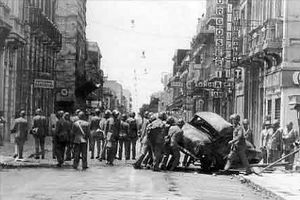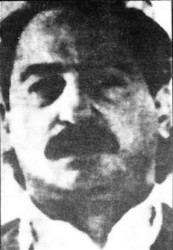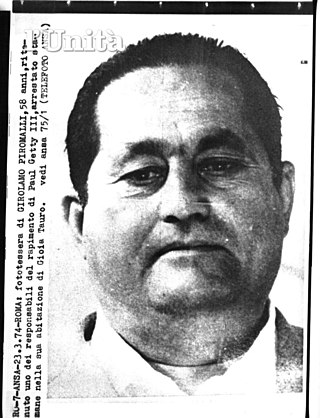Related Research Articles
Reggio di Calabria, commonly and officially referred to as Reggio Calabria, or simply Reggio by its inhabitants, is the largest city in Calabria as well as the seat of the Regional Council of Calabria. It has an estimated population of nearly 200,000 and is the twenty-first most populous city in Italy, after Modena, and the 100th most populated city in Europe. Reggio Calabria is located in the exact center of the Mediterranean and is known for its climate, ethnic and cultural diversity. It is the third economic centre of mainland Southern Italy. About 560,000 people live in the metropolitan area, recognised in 2015 by Italy as a metropolitan city.
The 'Ndrangheta is a prominent Italian Mafia-type organized crime syndicate based in the peninsular region of Calabria and dating back to the 18th century. It is considered one of the most powerful organized crime groups in the world. Since the 1950s, following wide-scale emigration from Calabria, the organization has established itself worldwide. It is characterized by a horizontal structure made up of autonomous clans known as 'ndrine, based almost exclusively on blood ties. Its main activity is drug trafficking, on which it has a near monopoly in Europe, but it also deals with arms trafficking, money laundering, racketeering, extortion, loan sharking, and prostitution. The 'Ndrangheta enjoys a privileged relationship with the main South American cartels, which consider it their most reliable European partner.

Gioia Tauro is a comune (municipality) in the Metropolitan City of Reggio Calabria (Italy), on the Tyrrhenian coast. It has an important port, situated along the route connecting Suez to Gibraltar, one of the busiest maritime corridors in the world.

Platì is a town and comune (municipality) in the province of Reggio Calabria, in Calabria, southern Italy. It rises 300 metres (980 ft) above sea level on the slope of the Aspromonte mountains and is located next to the Aspromonte National Park.

Rosarno is a comune (municipality) in the Metropolitan City of Reggio Calabria in the Italian region of Calabria. It is about 70 kilometres (43 mi) southwest of Catanzaro and about 50 kilometres (31 mi) northeast of Reggio Calabria. Rosarno stands on a natural terrace cloaked in olive plantations and vineyards on the left bank of the river Mesima, overlooking the Gioia Tauro plain. The town is an important agricultural and commercial centre known for the production of citrus fruits, olive oil, and wines.

The Reggio revolt occurred in Reggio Calabria, Italy, from July 1970 to February 1971. The cause of the protests was a government decision to make Catanzaro, not Reggio, regional capital of Calabria. The nomination of a regional capital was the result of a decentralization programme of the Italian government, under which 15 governmental regions were concretized and given their own administrative councils and a measure of local autonomy.

Antonio Macrì, popularly known as Zzi 'Ntoni, was a historical and charismatic boss of the 'Ndrangheta, a criminal and mafia-type organisation in Calabria, Italy. He was born in Siderno on the Ionian coast of Calabria and was the capobastone of the 'ndrine in his hometown.

Paolo De Stefano was an Italian mobster and member of the 'Ndrangheta who became the undisputed boss of Reggio Calabria. Together with his brothers Giovanni, Giorgio and Orazio he headed the De Stefano 'ndrina.

Giuseppe Piromalli, also known as "Peppino", was an Italian criminal known as a member of the 'Ndrangheta in Calabria. A native of Gioia Tauro, Piromalli was one of the most famous of the 'Ndrangheta bosses and headed the Piromalli 'ndrina. He redirected the 'Ndrangheta clan from its rural base to an entrepreneurial criminal organisation.

Girolamo Piromalli, also known as Mommo, was an Italian mobster and member of the 'Ndrangheta. He was capobastone of the Piromalli 'ndrina based in his home town Gioia Tauro on the Tyrrhenian coast of Calabria.
Antonio Nirta was a boss of the 'Ndrangheta, a Mafia-type organization in the Italian region of Calabria. Together with his brothers Giuseppe, Francesco, and Sebastiano, he ruled San Luca, a stronghold of the 'Ndrangheta.

The Piromalli 'ndrina is one of the most powerful clans of the 'Ndrangheta, a criminal and mafia-type organisation in Calabria, Italy. The 'ndrina is based in Gioia Tauro on the Tyrrhenian coast. The Piromalli's are allied with their relatives of the Molè family, also from Gioia Tauro. Often they are referred to as the Piromalli-Molè clan. The Piromalli clan contains more than 200 members.
The De Stefano 'ndrina, or the De Stefano family or De Stefano-Tegano family, is one of the most powerful clans of the 'Ndrangheta, a criminal and mafia-type organisation in Calabria, Italy. The 'ndrina hailed from the Archi neighbourhood in Reggio Calabria. Several of its members were included in the list of most wanted fugitives in Italy. According to prosecutor Salvatore Boemi, the De Stefanos are the representation of the manager-criminal controlling a crime multinational with joint ventures with Raffaele Cutolo from the Camorra and Nitto Santapaola and Francesco Ferrera from Cosa Nostra in Catania.
The Bellocco 'ndrina is a clan of the 'Ndrangheta, a criminal and mafia-type organisation in Calabria, Italy. The 'ndrina is based in Rosarno, on the Tyrrhenian coast, and belongs to the locale of that town, particularly very active in drugs trafficking, arms trafficking, extortion and control of commercial and entrepreneurial activities.
Saverio Mammoliti, also known as Saro, is an Italian mobster and member of the 'Ndrangheta. He was the capobastone of the Mammoliti 'ndrina based in Oppido Mamertina and Castellace in Calabria. In 2003, he became an informant when he decided to collaborate with Italian justice. Saro Mammoliti's nickname was the "playboy of Castellace" for his good looks and taste in women.
The Camera di Controllo, is a collegial body of the 'Ndrangheta, a Mafia-type organisation in Calabria. It is also known as La Provincia or Camera di Compensazione. It is composed of leading 'Ndrangheta members to decide on important questions concerning the organization and settling disputes.

The Port of Gioia Tauro is a large seaport in southern Italy. It is the largest port in Italy for container throughput, the 9th in Europe and the 6th in Mediterranean sea. Located north of the city of Reggio Calabria, between the municipalities of Gioia Tauro and San Ferdinando, Calabria, it is close to the East–West route which stretches from the Strait of Gibraltar to the Suez Canal and serves mainly as a transshipment hub, connecting the global and regional networks that cross the Mediterranean.
The October 21–22, 1972 bombings in Italy were nine terrorist attacks that took place during the night. The target of the attacks were a number of trains headed to Reggio Calabria, bringing workers to the city for the protest march scheduled for the next day. The attack was part of a larger set of bombings perpetrated by neo-fascist terrorists belonging to the National Vanguard, linked to the Movimento Sociale Italiano party and Francesco Franco, leader of the revolt in Reggio Calabria sparked by the choice of Catanzaro as regional capital.

The First 'Ndrangheta war was an internal struggle in the 'Ndrangheta, a Mafia-type criminal organisation in Calabria. The conflict raged from 1974 to 1977 and resulted in approximately 233 deaths. The war broke the equilibrium in the triumvirate, made up of Antonio Macrì, Domenico Tripodo and Girolamo Piromalli, that had ruled the 'Ndrangheta for 15 years, and facilitated the rise of a new generation 'Ndranghetisti, in particular the De Stefano 'ndrina, who wanted to involve the 'Ndrangheta in new, more lucrative criminal activities.
The Mancuso 'ndrina is a very powerful clan of the 'Ndrangheta, a criminal and mafia-type organisation in Calabria, Italy. The 'ndrina is based in Limbadi and Nicotera and is considered by the investigative bodies as the most influential clan in the province of Vibo Valentia.
References
- 1 2 Guarino 2004, p. 22.
- ↑ Cuzzola 2001, p. 49.
- ↑ Badolati 2007, pp. 60–61.
- ↑ Itri, Maria. "Nella notte di Ferentino". Cinque anarchici del sud: Una storia degli anni Settanta (in Italian). LSDI. Retrieved 16 March 2023.
- ↑ Cuzzola 2001.
- ↑ Caprara & Semprini 2011, p. 262.
- ↑ Guarino 2004, p. 27.
- ↑ D'Amelio, Angela. "Cinque anarchici del Sud". Uonna.it (in Italian). Retrieved 16 March 2023.
- 1 2 Bellu, Giovanni Maria (10 April 2001). "Cinque anarchici morti e una strage Scoprirono la verità, li uccisero". La Repubblica (in Italian). Retrieved 16 March 2023.
- ↑ Badolati 2007, pp. 61–62.
- ↑ Caprara & Semprini 2011, pp. 262–263.
- ↑ Guarino 2004, p. 26.